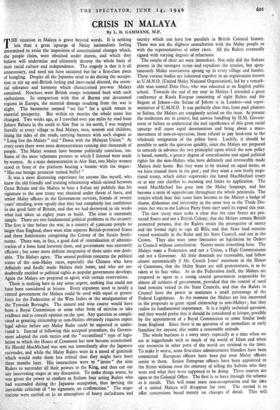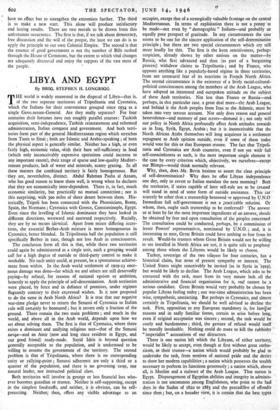CRISIS IN MALAYA
By L. D. GAMMANS, M.P.
THE situation in Malaya is grave beyond words. It is nothing less than a great upsurge of Malay nationalistic feeling determined to resist the imposition of constitutional changes which, the people claim, were obtained under duress, and which they believe will undermine and ultimately destroy the whole basis of their racial culture and independence. The tragedy is that it is all unnecessary, and need not have occurred but for a first-class piece of bungling. Despite all the Japanese tried to do during the occupa- tion to stir up anti-British feeling and inter-racial discord, the essen- tial tolerance and harmony which characterised pre-war Malaya remained. Nowhere were British troops welcomed back with such enthusiasm. In comparison with that of Burma and devastated regions in Europe, the material damage resulting from the war is slight. The barometer seemed " set fair " for a quick return to material prosperity, But within six months the whole scene has changed. Two weeks ago, as I travelled over soo miles by road from Johore Baharu in the south to Alor Star in the north, I was stopped literally at every village to find Malays, men, women and children, lining the sides of the roads, carrying banners with such slogans as " Long live the Malays " and "Down with the Malayan Union." At every town there were mass demonstrations running into thousands of people. The Malay women have become politically conscious, too. Some of the most vehement protests to which I listened were made by women. At a mass demonstration in Alor Star, two Malay women stood in front of the platform bearing a banner with the slogan: "Has our benign protector turned bully? "
It was a most distressing experience for anyone like myself, who knew the old friendly and trusting relationship which existed between Great Britain and the Malays to hear a Sultan say publicly that his signature to the new treaty was obtained under threat of force, and senior• Malay officers in the Government services, friends of twenty years' standing, avow openly that they had completely lost confidence in .the good- faith of Britain, and that we had-destroyed in six weeks what had taken us eighty years to build. The issue is extremely simple. There are two fundamental political problems in the country. The first is that before the war, in a country of 5,000,000 people no larger than England, there were nine separate British-protected States and three Settlements comprising the Colony of the Straits Settle- ments. There was, in fact, a good deal of centralisation of adminis- tration of a loose kind between them, and government was extremely efficient ; but some more definite integration of these units was desir- able. The Malays agree. The second problem concerns the political status of the non-Malay races, especially the Chinese who have definitely and finally made Malaya their home, and who are un- doubtedly entitled to political rights as popular government develops, Again the Malays are prepared to agree; with certain reservations.
There is nothing here in any sense urgent, nothing that could not haVe been considered at leisure. Every argument used to justify a central government for Malaya could be used with equal or greater force for the Federation of the West Indies or the amalgamation of the Tyneside Boroughs. The natural and wise course would have been a Royal Commission or some other form of mission to take evidence and to consult opinion on the spot. Any question so compli- cated as granting citizenship to non-Malays obviously requires expert legal advice before any Malay Ruler could be expected to under- stand it. Instead of following this accepted procedure, the Govern- ment adopted the rush tactics and the " streamlined " type of legis- lation to which the House of Commons has now become accustomed. Sir Harold MacMichael was sent out immediately after the Japanese surrender, and while the Malay Rulers were in a mood of gratitude which would make them less critical than they might have been three months later. His instructions were to "invite" the nine Rulers to surrender all their powers to the King, and thus cut out any intervening stages or any discussion. To make things worse, he was given the power to confirm as Sultans four acting Rulers who had succeeded during the Japanese occupation, thus inviting the inevitable criticism of " no signature, no confirmation." The nego- tiations were carried on in an atmosphere of heavy melodrama and secrecy which can have few parallels in British Colonial history. There was not the slightest consultation with the Malay people or with the representatives of other races. All the Rulers eventually signed with varying degrees of reluctance.
The results of their act were immediate. Not only did the Sultans protest in the strongest terms •and repudiate the treaties, but spon- taneously Malay associations sprang up in every village and hamlet. These various bodies are federated together in an organisation known as U.M.N.O. (United Malay National Organisation), led by a remark- able man named Dato Onn, whc was educated at an English public school. Towards the end of my tour in Malaya I attended a great conference at Kuala Kangsar consisting of eight Rulers and the Regent of Johore—the Sultan of Johore is in London—and repre- sentatives of U.M.N.O. It was perfectly clear that, from padi planters to Sultan, the Malays are completely united on the issue. At present the moderates are in control, but unwise handling by H.M. Govern- ment or failure to understand the real significance of this great racial upsurge will cause rapid deterioration and bring about a mass- movement of non-co-operation, from refusal to pay land-rent to the wholesale resignation of the police force. Luckily, it should be possible to settle the question quickly, since the Malays are prepared to concede in advance the two principle upon which the new policy is based, namely, a greater degree of centralisation and equal political rights for the non-Malays who have definitely and irrevocably made Malaya their home. But they want to be treated on equal terms, as we have treated them in the pasi; and they want a new freely nego- tiated treaty, which either supersedes the hated MacMichael treaty or at any rate clarifies its meaning and limits its application. The word MacMichael has gone into the Malay language, and has become a term of opprobrium throughout the whole peninsula. The treaties which bear that name have become to the Malays a badge of shame, dishonour and inferiority in the same way as the Trade Dis putes Act was to the Labour Party from 1927 until its repeal this year.
The new treaty must make it clear that the nine States are pro- tected States and not a British Colony, that the Malays remain British protected persons, that the Rulers retain the prerogative of mercy and the formal right to sign all Bills, and that State land remains vested nominally in the Ruler and his State Council, and not in the Crown. They also want some limitation on legislation by Orders in Council without consultation. Names mean something here. The Malays want a Federation and not a Union, a High Commissioner and not a Governor. All their demands are reasonable, and follow almost automatically if Mr. Creech Jones' statement in the House of Commons, that the Malay States are still protectorates, is to be taken at its face value. As to the Federation itself, the Malays arc prepared to agree to a strong central government responsible for almost all subjects of government, provided that the control of rural land remains vested in the State Councils, and that the Rulers in Council have the power to nominate a small percentage of the Federal Legislature. At the moment the Malays are less interested in the proposals to grant equal citizenship to non-Malays ; but they realise its fundamental importance. It is a highly technical question, and they would prefer that it should be considered at leisure, possibly by the appointment of a Royal Commission or some iimilar body from England. Since there is no question of an immediate or early franchise for anyone, this seems a reasonable attitude.
The whole business is a sorry story. especially at a time when we are at loggerheads with so much of the world of Islam and when our resources in other parts of the world are strained to the limit. To make it worse, some first-class administrative blunders have been committed. European officers have been put over Malay officers senior to them. Senior European officers have been appointed to the States without even the courtesy of telling the Sultans who they were and what they were supposed to be doing. Three courses are open to the Colonial Office. The first is to force through the scheme as it stands. This will mean mass non-co-operation and the idea of a united Malaya will disappear for ever. The second is to offer concessions based merely on changes of detail. This will
have no effect but to strengthen the extremists further. The -third is to make a new start. This alone will produce satisfactory• and lasting results. There are two morals to-be drawn from- this unfortunate occurrence. The first is-that, if we talk about democracy, free discussion and the will of the people, the least we can do is to apply the principle to our own Colonial Empire. The second is that the essence of good government is not thq number of Bills rushed through the House of Commons, but the extent to which vital changes are adequately discussed and enjoy the support of the vast mass of the people.































 Previous page
Previous page